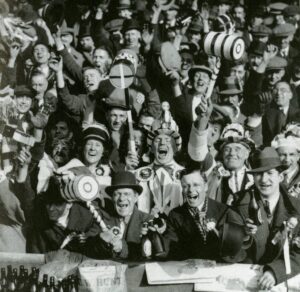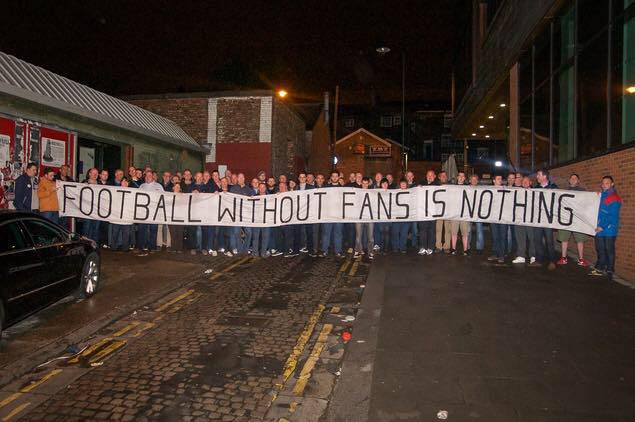In 1992, led by the Inspirational Brian Lomax (which became his semi-official title amongst activists), Northampton Town Supporters’ Trust was created. The first supporters’ trust set out a new way for fans to be involved in their football clubs, beyond fanzines and picketing the directors’ box, and ensuring the long-term security & stability of their clubs.
No-one else was holding powerful to account, not the FA and certainly not the clubs. There is no other word for it but failure.
David Conn’s first two books are the seminal works on the chaos of football at the time, but it’s well known that it had been wrecked by years of absent governance, mismanagement, poor decision making and overspending by casual owners, and sometimes, as in the case of Ken Richardson at Doncaster Rovers, outright criminality. No-one else was holding powerful to account, not the FA and certainly not the clubs. There is no other word for it but failure.
In the same year as Lomax and Northampton Town supporters’ trust were taking their seats as directors of the club in exchange for a council assisted new stadium, setting out a different way of doing things, the owners of the breakaway 22 of the Premier League were embedding self-interest in the superstructure of football. Northants neighbours Kettering Town’s Poppies Trust swiftly followed, then in 1999 Crystal Palace Supporters’ Trust – the latter arguably could have been at least part owners of the club had certain things happened differently.
Supporters Direct (SD) was created very soon after (Jan 2000), the result of a compromise made as a result of the FA, Football League and Premier League declining to back the establishment of an independent regulator for football. It began a decade or more of success in cleaning up football’s mess, beginning to hold those clubs who had had it their own way for too long, to account. A slew of supporters’ trusts were set-up, dodgy deals exposed, grounds saved, clubs bought or re-established phoenix-like. As it grew, the idea spread into the Premier League. Manchester United and Spurs fans were early adopters, but eventually the idea spread far and wide. The movement had really come to fruition when Spurs, Chelsea and Arsenal Supporters’ Trusts and Manchester United and Liverpool (Spirit of Shankly) were coordinating not just matchgoing action on ticket prices, but calling clubs to account on governance and communication with fans.
It’s wrong to say that supporters’ trusts exist to save clubs, because they’re more than that. They’re there to ensure that clubs remain true to their roots and existence as communal organisations.
Solidarity had become their concern, even if the clubs had ditched it. It’s wrong to say that supporters’ trusts exist to save clubs, because they’re more than that. They’re there to ensure that clubs remain true to their roots and existence as communal organisations. Clubs can become brands, they can try to grow their fanbase beyond the city or town they’re from, but they’re always football clubs from that place, and the supporters’ trusts exist, at least in part, to keep them connected and honest. At the top of football, this can sometimes look like a mountain to climb but frequently means being embedded in the politics of the club, operating an informal shuttle diplomacy, often stopping bad ideas before they emerge. Trusts at this level are frequently involved in the new Fan Advisory Boards or similar ‘Fans Parliament‘. Further down, it often means being on the football club board to represent fans, or even as an owner. All of these roles are in part about trying to prevent and reduce the divide that can open up between those running the business and those trooping up to watch week-after-week, and more positively perhaps, acting as a bridge, building and developing relationships.

Assuming that the role of supporters’ trusts was to save clubs from financial collapse is a simplistic and incorrect rendering of history (though nonetheless their track-record meant we still have the structure of football that we do, and many more clubs further down). A better way to put it is that they have in fact spent years saving football from itself: financially, morally, administratively, culturally, which means that they matter whether you’re a fan at the top or the bottom of football. Their continued presence serves as constant reminder that football is more than just the 90 minutes.
What about all the other organisations out there representing fans? They are all legitimate in their own ways, but almost always focused on one particular concern, one group, one issue, or a narrow set. The whole point of a supporters’ trust comes down to its rooting as a democratic, member-led, community-focused organisation that looks at things holistically. It’s why the ‘Community Benefit Society’ structure was chosen in the first place, and why they’re interested in ownership, governance, accountability. The big themes. The ability of fans to self-organise within a democratic structure to bring people together under a clear and unambiguous mission to ensure the long-term security of their clubs was and remains a great uniter.
There’s a sense amongst some in the game – naively in my view – that their time might be up, that in a world of multi-level engagement, fan engagement strategies and plans, we just don’t need them. But that is to misunderstand the basic politics at play. In fact, though their fortunes may wax and wane, their time has never really gone.
Supporters’ trusts should be operating alongside all the other structures of engagement. They should add to it, not take away from it.
As someone who advises clubs and is interested in engagement at all levels of clubs and the game itself, organised and independent minded groups of supporters seeking a constructive role in the life of their clubs is in my view a gift. Any other industry or sector would be crying out for people prepared to offer their labour, often their expert insight, usually for nothing, simply because they like the company, brand or service. Supporters’ trusts should be operating alongside all the other structures of engagement. They add to it, not take away from it.
When Brian Lomax inspired us all, he wasn’t just setting up an emergency service to dig poor owners out. He was providing fans with a vehicle to keep clubs rooted, and that has never been more important or valuable than it is now.

4 thoughts on “Does football still need activists?”
A brilliant piece that captures the beating heart of a Trust! I think we need to consider how to immerse traditional business skills into the culture more effectively. There are people out there who really want to help, and who can! Understanding that the culture is being led from the liquid and vast collective of the terraces makes it incredibly difficult for them to be as effective as clubs may need them to be. Next step is to make that possible!
It’s a really good observation. How much does your experience at Exeter City as owners vary from those not in that position I wonder? In many respects similar, but with a different focus.
A point that seems important to emphasise is that there is no ‘one size fits all’ Supporters Trust. Different clubs have different issues to deal with, whether it’s owners who ignore the wishes of the fans, clubs being ruined financially by their ownership structure or indeed whether its ensuring that fan ownership is truly representative of the community it purports to be part of. Personal experience also suggests that the replacement of SD by FSA has not improved the chances of establishing a strong cohort of EFL Trust owned clubs.
Thanks for the post, Dave. There is definitely no ‘one size fits all’, no, but there is definitely a shared cause or perspective, of holding clubs to account at whatever level and however that takes in terms of form.